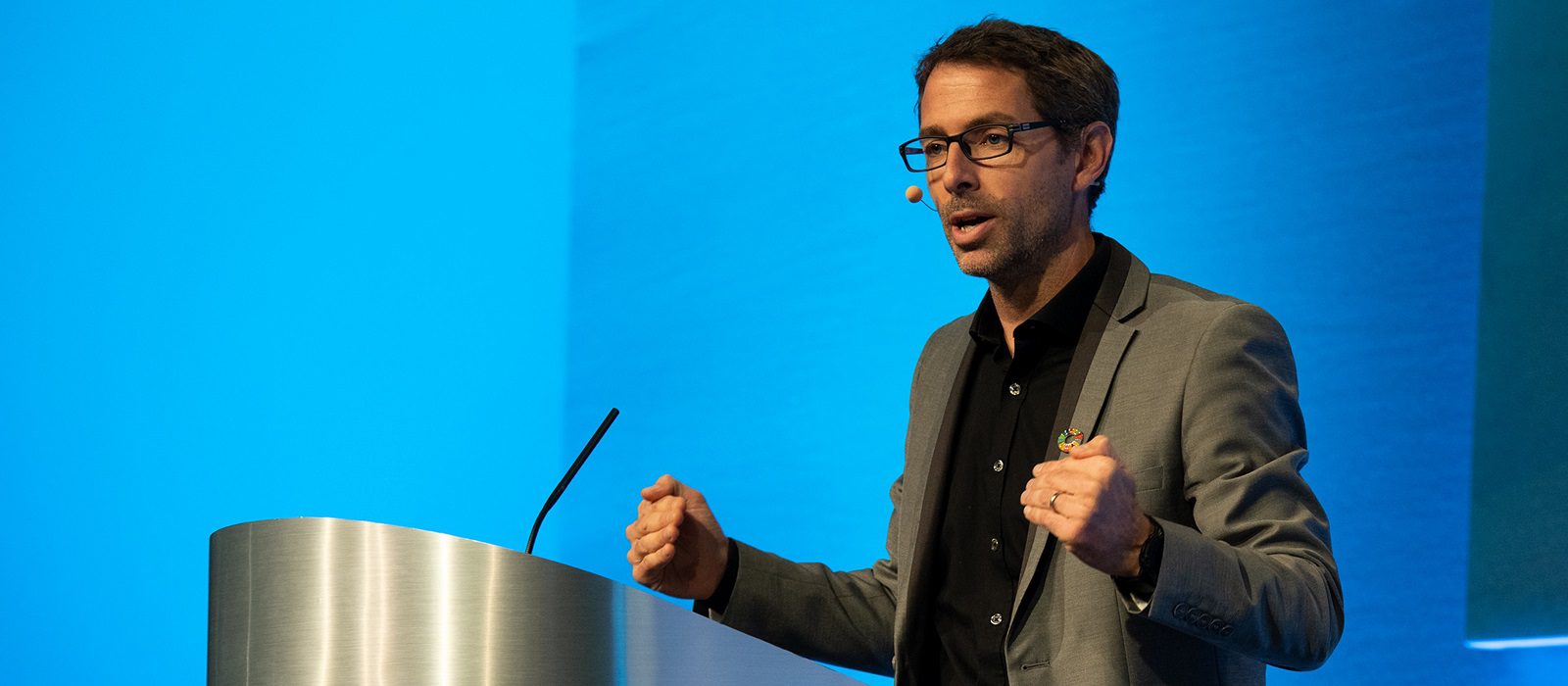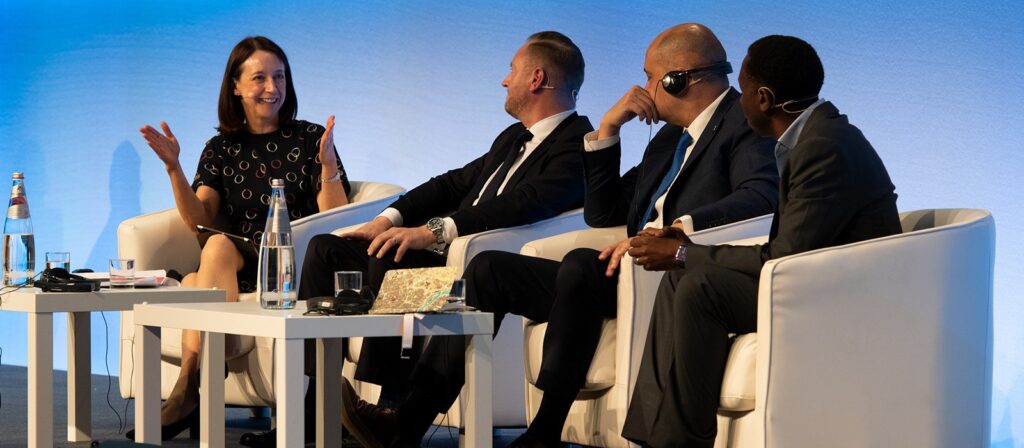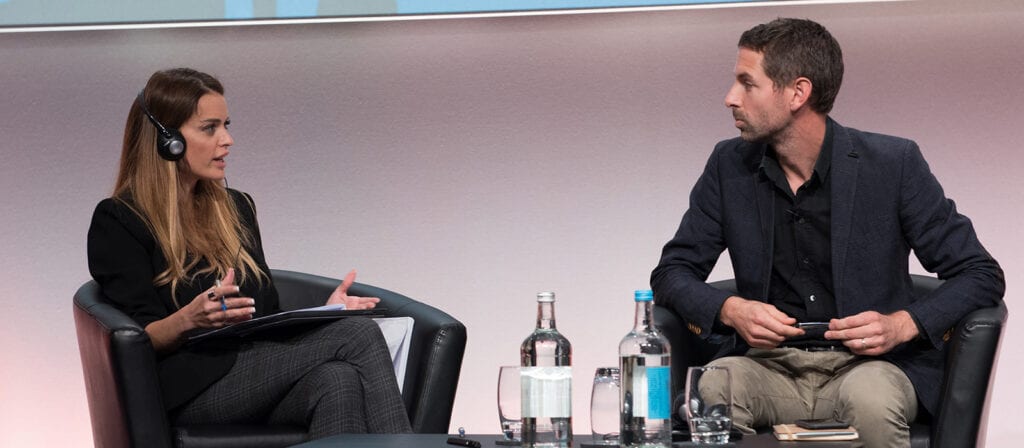To Desjardins, innovation is a key driver for transformation and they identified three different sources to allow them to tap into and become exposed to the latest innovation and innovative thinking from across the world.
The first source was connecting with the innovation hub. Their first partnership was with Plug and Play, based in Silicon Valley (USA), but with a global footprint. This keeps them connected to start-ups with brand new technology in its earliest stages.
The second source is investment funds. They dedicated a sum of $250 million which they would spend in investment funds in four sectors tied to their innovation approach: PropTech, HealthTech, Insurtech and climate.
The third source is acting as a growth accelerator for startups. One example of which is Cooperathon, the largest open innovation challenge that exists in Canada. Desjardins provide support to the winner in order to bring their idea to life. They also have a start-up in residence where the winning startups are provided with office space within the Desjardins offices for eight months and given access to 50 mentors and other support they need i.e. legal and accounting.
Three case studies of solutions targeting prevention and raising awareness:
- Roost and Alert – 10 to 15 years ago, water damage represented 25% of the losses in property insurance in Canada which has increased to 50% in recent years. Desjardins partnered with Roost, an Insurtech company specialising in property telematics to provide water sensors to a large proportion of their property insurance policyholders. Customers would get alerts through an app in the case of a leak which reduced the damage to properties.
- CMT and Ajusto – Desjardins looked globally for a company who could fast track their telematic car insurance programme. They partnered with Cambridge Mobile Telematics (CMT) to create a smartphone-based approach.
- Telehealth with TELUS – Through a partnership with Telus, one of Canada’s largest telecommunications providers, it offers a virtual health care service in answer to challenges within the health system.
Desjardins’s experience with ecosystems began in 2017 when a consultant warned that they would not succeed if they did not work on ecosystems. They began working on ecosystems in the three areas examined in the case studies above: property, mobility, and health.
Over the last 10 years, when MAIF (France) discussed innovation, they focused on the digital revolution. However, the real revolutions are the impact and the climate revolutions; and also how technology is going to serve these revolutions. It is important for MAIF not to “invent for inventions sake” so they examined what they had learnt over the last 10 years and tried to implement innovation principles in a concept they call “hybridization”: mixing the DNA of MAIF with the DNA of its partners. MAIF has been working with partner companies – often businesses that are not insurance companies, such as start-ups – to help their transformation and address the needs of their customers.
One example of this is MAIF’s work with bike couriers. They worked with a small courier company and created a non-life insurance programme for the couriers. Following this, they looked for a cooperative partner and found CoopCycle who supply 70 independent couriers in 70 cities with the digital infrastructure needed to link up to local restaurants. MAIF and CoopCycle signed a partnership so new couriers that joined CoopCycle were able to benefit from MAIF’s offering. This product offering is based on MAIF’s purpose, to export their principles as an insurance business to be able to sell insurance products with partners they have selected carefully.
The days of calling up your insurance company are in the past and so new interfaces have to be found. In response to this, MAIF has developed insurance-as-a-service, making insurance available quicky, pooling costs with their partners. They have developed an API portal with their partners, which allows them to know which APIs are accessible to help them develop business, simulate tariffs and produce quotes.
Over the course of their journey, MAIF have stuck to their DNA and developed their core business and their insurance products, in a way that is in keeping with customer’s needs. They protect their core business by overseeing new products in business incubators and are permanently transforming the group and the value chain simultaneously. Their next step is to go reach the top of their aspirations pyramid and find the right partners to develop relationships with.
For Cyberscout, cyber means “people’s control of machines”. As machines get more intelligent, this means looking at how to manage this technology. The $7 billion cyber insurance industry is mostly enterprise risk, insuring large companies. Small commercial and personal cyber insurance is a new type of insurance which has been overlooked, but is growing. Insurance against cyber risk has benefits for the insuring organisation, such as being perceived as an innovator.
There has been a 700% increase in phishing attacks, and ransomware attacks on homes are the number two type claim. The commingling of work and home only increases this risk to families and businesses as it greatly increases the attackable surface.
A survey by Cyberscout, asking respondents where they go for cyber solutions to protect their family from cyber risks, found that 31% would go to their insurance company; 21% their bank; 10% their employer; and 38% did not know. The insurance industry is the logical source people would go to for cyber protection.
A survey of ICMIF members found that 59% had cyber insurance add-ons to their policies; and 15% were actively working on introducing a cyber offering. The 26% that were not pursuing cyber offerings stated that their main reasons for this were no in-house cyber expertise; concerns over systemic cyber and risk aggregation; and lack of interest from policyholders in cyber.
When asked what was most important when delivering a cyber offering: 46% said post-loss services; 31% said comprehensive coverage; 19% said risk assessment; and 4% said pre-loss services. Coverage is not limited to hacking, phishing and fraud, but also covers households for issues such as cyber bullying. Risk management, protection and prevention are important to ICMIF members, and they appear to be looking for a holistic solution, not just insurance coverage.
A case study by Univé showed that five years ago, when Univé launched an optional cyber product for the private market, it was unsuccessful. Market research revealed that there was low awareness of cyber risk; problems with knowing vs acting; responsibility of insurer and advisor; and a lack of willingness to pay. Their solution was to partner with reinsurers and Cyberscout and fully-embed cyber insurance into all insurance products as standards, making them non-optional.
Session speakers:
- Denis Dubois, President and COO, Desjardins Financial Security (Canada)
- Thomas Ollivier, Head of Partnerships and Development, MAIF (France)
- Matthew Cullina, Head of Global Cyber Insurance Business, Cyberscout – A TransUnion Brand (USA)
- Clare Himmer, CEO, Berkley Re UK, moderator








